|
|
|
|
|
Thomas
P. Hughes: during the interview on Friday,
6th of April 2001 in his house in Philadelphia, PA.
|
Manfred Hulverscheidt :
Why did you focus on Thomas Edison as a predominant
figure in the historian of technology?
Thomas
P. Hughes: I turned back to Edison, because
he is a representative American. He is a self made person,
he grew up on a farm, did not finish grammar school, worked
as a telegraph messenger then as a telegraph operater. And
then he responded to American‘s desire in the 1860s and
70s for material goods because Americans who came from Europe
were mostly quite poor. They came from simple circumstances
and so they dreamed, when they came to America, not only to
have political freedom, but also to have economic goods. And
Edison responded to that with the things he invented. He invented
consumer technology, phonograph, electric lighting. So he
became an American hero. And so I study Edison as to try to
understand the essence of the American character, at least
for me.
|
|
MH: What's been left of the technological enthusiasm of his
time?
TPH:
Well we thought, when I say we, I‘m thinking
of Americans, Americans thought early in the 20th century
that machines such as the ones that Edison invented would
produce the goods that Americans desired so avidly and we
weren‘t deeply concerned about the impact technology
might have on us, because we thought of it as being a source
of those material goods that we wanted. And it wasn‘t
until after World War One and World War Two that we began
to doubt our ability to control technology. The atom bomb
for example is technology, that‘s very different from
an electric light system, and electric light systems we feel
comfortable with, what Edison invented, atom bombs we do not
feel comfortable with. So this technological enthusiasm associated
with Edison‘s inventions and the many other independent
inventors of the early period, this enthusiasm tended to evaporate
after the two world wars whom we saw the destructive face
of technology.
|
|
MH: Could
you describe the impact of the electrical potential for people
before the first world war?
TPH:
Well electricity was probably the most exciting, stimulating
technology that had ever come into the possesion of human
beings. It was mysterious because one cannot see it, one can
feel it, it can be used to produce light, it can be used to
send telegraph signals and it was thought that people such
as Edison that worked with it and understood it were wizards
or and were bringing us gifts of a quality that we didn‘t
dream existed. So electricity was much more exciting than
steam. And I have some quotations from persons alive in 1900,
1890 and they said that steam would not compare in its impact
to the influence that electricity would have upon our lives.
And I remember one of my professors years ago when he heared
that I was studying the history of electricity, this was a
history professor, he said what is electricity? And this was
only a few years ago. Again this mysterious force that one
can‘t see that can move trains, that can light cities.
It‘s still an exciting technology, electricity. And Edison
was thought of as a person that could bring it to us and control
it. And I think that electricity is one reason why he is such
a heroic figure, more so than the inventors of mechanic devices.
|
|
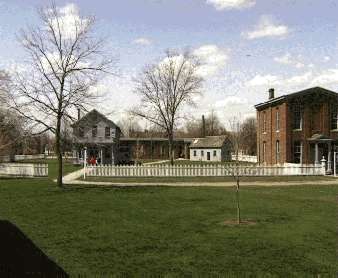
Edison's first professional laboratorytat Menlo Park, N.J,
reconstructed in Greenfield Village (Henry Ford Museum), Dearborn,
Mi.
|
|
MH:
You pay much attention to the independent inventors
of this period. What is the reason for their historical decay?
TPH:
The independent inventors were responsible
in 1880, 1890, 1900 for the remarkable array of systems. Think
about it for a momen: Edison, an independent inventor, gave
us electricity light and power systems. The Wright brothers,
Orville and Wilbur, gave us aviation as a system. Alexander
Graham Bell is responsible for the telephone system, he was
an independent inventor. And then we could identify radio
inventors, wireless it was called then, who were independent,
such as Reginald Fessenden, an American major radio inventor.
The list is long of independent inventors who gave us the
systems within which we live today. We‘re surrounded
by wireless radio, we‘re surrounded now by television
of course, we‘re surrounded by electric light and power
systems, surrounded by aviation. We live in a world structured
by the systems as these independent inventors, most of them
Americans and most of them men, I can‘t think of a major
woman flourishing as an independent inventor in the late 19th
century. Well they initiated these systems and then after
the systems were established, lets take electrical light and
power, large corperations began to manufacture the componants
of these systems. Like General Electric Company, Siemens in
Germany for example, AEG in Germany. So large companies were
now manufacturing the componants of the systems that Edison
and other independant inventors produced, innovated. And the
large companies didn‘t initiate, didn‘t originate
large systems, they improved them. And scientists in the early
20th century at a place like General Electric Labotary were
much more conditioned, encouraged, asked to improve what the
independent inventors had brought into the world. And scientists
would make these minor improvements say in the filament of
an electric light, whereas Edison invented the whole system.
The scientists in the labatories were making minor improvements
and the scientists argued that they were the ones who would
now advance technology, not the independent inventors. But
remember they are making accumulative improvements, not coming
up with new systems. And that‘s because the companies
for whom they worked had what we would call a product line:
Electric light and power. So the large companies, one of these
accumalatively improves, so a new kind of person comes onto
the scene and that is the industrial scientist. So the independent
inventors are pushed into the background.
|
|
|
|
MH:
Great inventive personalities have also existed during the
Renaissance-period. Can you descibe the major difference between
inventors like Leonardo and those like Edison?
TPH:
The independent inventors of the late 19th
century were as innovative, imaginativ,e creative as the great
inventors of the Renaissance such as Leonardo da Vinci, he
being the outstanding example. I think the major difference
between the Edisonian inventors and the inventors of the Renaissance,
but remember that both groups were remarkably resourceful
and inventive, the major difference is by 1900 because of
the development of technology we were able to remake the world
into these circumstances according to the circumstances by
which we wish to live. We had such power over nature by 1900
that we could transform the natural world into a human built
world. And therefore we had the responsibility or they had
the responsibility to create a world in which humans would
feel comfortable, I‘m speaking of the Edisonian type
inventors. But the Renaissance inventors and scientists didn‘t
have that much control over nature. So nature was still the
environment in which most people lived during the Renaissance
but our human built world was the environment in which people
in at least the western industrial world were living by 1900.
And we, that is humans, were creating this world for better
or for worse and no longer could we blame the inadequacies
of our world upon God or upon nature, we had ourselves to
blame. Because we were making it, we were designing it, we
were deciding what would be in it. In the case of the Edisons
it would be electricity , in the case of the Bells it would
be telephone and in the case of military inventors it would
be submarines and machine guns. I don‘t think we realised
or our fathers and forefathers and mothers who lived around
1900 I don‘t think they realised the responsibility they
had for the world they were creating.
|
|
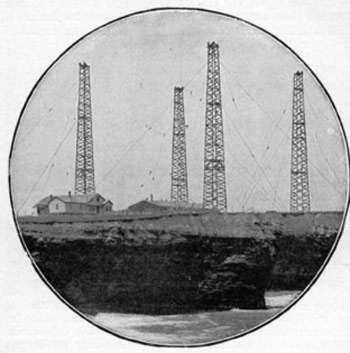
Guilelmo
Marconi's Wireless Telegraph Station, New Scotland, 1903
|
|
MH:
What was the role of the military in this context?
TPH:
Well, Edison in electric light and power
systems, Edison was not dependent on the military for funding.
Electric light and power systems were not financed by the
military, the wireless the radio was funded mostly by the
military. This in the period of 1900 to 1910 when Marconi,
Fessenden and De Forest and others were bringing radio into
use. Much of the support came from the military, not only
in the United States but in England and also in Germany. Why
was that? For one thimg the navy was extremely interested,
because ships at sea could only communicate over the ether,
they called it then. And so the navy was very active in supporting
wireless. Some of the navy captains didn‘t like this,
the captains of the ship, because formerly when a ship put
out to sea the captain was off orders from his higher echelon,
from his commanding officers. He was the captain on the ship,
out at sea, he was the master of all he surveyed, but once
wireless came into being the command centers on shore could
communicate with the captain and tell him what to do. So some
of the captains were not too happy about the introduction
of wireless. But wireless allowed for naval ships to be coordinated
and controlled more effectively.
|
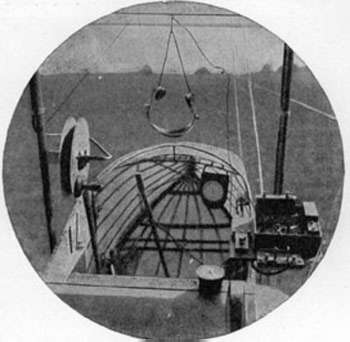
Telefunkenstation
auf einem amerikanischen Doppeldecker
|
|
MH: So feed back became
more important for rulership and command ...
TPH:
Absolutely, and also the British Empire
invented and developed in order to control and coordinate
the far flung colonies that belonged to Britain. So wireless
was very important for the tying together of the various colonies
that made up the British Empire and also the German colonies
and the German Homeland. So wireless was supported by governments
and was supported by the military to a greater extent than
lets say was electricity, which was a consumer good.
|
MH: What
happened with regards to electricity in the 20s, the post war
years?
TPH:
After the war the major developments were
associated with the electrical grid, that is the creation
of electric power systems, that spread across in the United
States, across much of the country. And this was true in Germany
too.
|
|
|
And so the carrying of the electricity into the countryside
was very important in the period between the two world wars
because initially electricity as lighting was concentrated in
the cities. But then after World War One it began to spread
onto the countryside because of the ways, which were found to
create large power networks, what we call grids now, that made
it possible to reach rural areas. So this, the development of
the grid, oh and then in this country between the two world
wars the development of the Tennessee Valley Authority. The
development of the Tennessee Valley Authority, which was an
effort to stimulate the economic development of a poverty stricken
area through the use of electrical power and through the making
of navigatable rivers and the restoring of the land and the
reforesting of the land. The Tennessee Valley Authority was
a great project initiated during the depression in The United
States to bring prosperity to one of the most poverty stricken
areas. And electrical power was a major part of that plan. This
was 1933 and into the late 30s. And ironically the great damms,
that were built to provide hydro electric power in the Tennessee
Valley, these great damms and the hydro electric power supplied
much of the energy, that made it possible to develop the uranium
that was used in World War Two and used in the atom bombs. So
electrical power that was used to bring economic improvement
to a valley, ultimately was used for destructive purposes.
|
|
MH: Do systembuilders cut it both ways?
TPH:
Well system builders want control. And
the great system builders, Walter Rathenau in Germany was
a great system builder, in the United States Samuel Insull
was a great system builder and Henry Ford was a great system
builder the automobil man. One characteristic is they want
to control all that could result in constraining their freedom
of action. In other words Henry Ford wants to make automobiles,
in order to make automobiles he wishes to control the source
of raw materials, he wishes to control the energy, he wishes
to control the worker, control everything that could in any
way limit or constrain his ability to make automobiles. So
system builders are very positive in one sense in that they
are putting together a great means of production like automobiles
plants and so forth, but at the same time there‘s a negative
side to the system builder in this drive to control what they
are ordering and what they are creating.
|
|
MH:
Those systems exclude the experiment, the uncertain outcome;
isn't it a remarkable contradiction to the aims of the genuine
independent inventor?
TPH:
One controls and if one controls, that
eliminates the unknown supposedly, the unexpected, that which
cannot be predicted. So sytem builders have a certain psychological
insecurity that‘s driving them to wish, driving their
desire to control. So there are positive and negative characteristics
of the system, of the system builder. Napoleon was certainly
a system builder in a non technological realm.
|
|
MH:
But how is this related to
electricity?
TPH:
In the case of electricity one of the most
stimulating challenges for the control engineer is to control
this force that cannot be seen; and this electricity is not
only a challenge for those who wish to control technology,
to control electricity, but also electricity is one of the
most effective ways of controlling machines. Most control
devices are electrical. So electricity is a challenge to the
person who wishes to control it and electricity is a means
for controlling. For example on great battle ships in World
War One electricity was used to find out where the enemy was
located and then electricity was used to automatically control
the great guns that were layed down on position to fire upon
the enemy. Electricity was essential to the functioning of
large battle ships because of the way it was used to control
the great guns and the gun fire. So it‘s a major motive
control is electricity, is today. Is today, you look around
your house. Many of your control devices are, your thermastats
are electrical devices, those things that control your heat
are electrical devices. In the automobile, most of the controls
in the automobile are electrical.
|
|
|
|
MH: Can system builders be artists?
TPH:
I don‘t have the impression that artists
are as determined to have control as are the system builders
in the realm of technology. As a matter of fact, after World
War Two major artists, such as the abstract expressionist,s
made a point of doing art that exhibited no control. For example
Pollock‘s drip painting is an example of no control painting.
The artists were reacting against the controls of the system
builders. The artists were reacting against the military industrial
universe complex and the artists, again I‘m thinking
primarily of the abstract expressionists, thought control
was the essence of negative technology. So art should not
exhibit control, it should be anti-control. And John Cage,
the highly imaginative American composer, was famous for his
compositions that involved no control of the musicians. Music
without a score, again to avoid control. And so no I don‘t
think of artists as system builders. Now the relation between
artists and inventors is much closer but not all inventors
are system builders. Some are like Edison, Edison was a system
builder, but the other inventors don‘t have a system
building chacteristics.
|
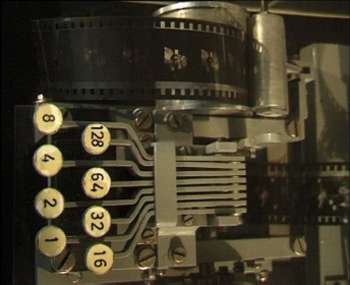
A
film strip as control
device of the first digital computer
In 1943, Konrad Zuse has built the Z3 without military support
in his parent's kitchen |
|
MH:
Are system builders megalomaniacs?
TPH:
When system builders want to control the
development of a large project, they find usually, that they
are unable to control it, the development of a large project,
highway project, weapon project, whatever it may be. So system
builders become realistic when they are brought up against
risk and uncertainty. So the best system builders are the
ones who steer a path in between unpredictability and control.
Because they know, that some things cannot be controlled,
other things can be controlled and they make a good choice
as to what to control and what not to control. And a good
system builder for example will not control highly imaginative
people, because they need their freedom in order to explore
their imaginations. On the other hand the routine workers
can be controlled. So the best system builders steer this
path between predictability and risk. But the ideal would
be to have complete control from the beginning of a project
until the end, but if the project is sufficiently complex,
that‘s impossible. Only engineering schools, where they
teach students have to solve problems sets, is everything
controlled but not in reality, not in practice. That‘s
one of the problems of engineering school education: the students
are taught to think, that the world is controllable, and when
they get out into it, then they learn that it is not.
|
MH:
What do you think was the main outcome from the war for
the history of technology focusing on electronics?
TPH:
The Germans early in the 19th century had
a very concise and effective way of describing electricity.
There was "Starkstrom" which was heavy electricity
and there was "Schwachstrom" which was light electricity.
And strong electricity is electrical power and electrical
lighting. That‘s heavy electricity, light electricity
is a telegraph and the wireless and radio and the electricity
that energizes computers and so forth. Well heavy electricity,
Starkstrom, had reached a plateau by WWII. The developments
in power and light were not dramatic after about 1925-1930.
|
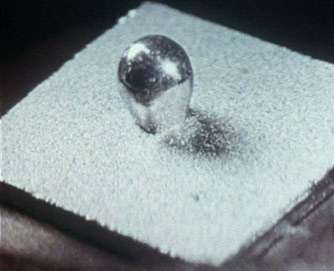
Dotation
of a semi-conductor
around 1955 ©SiemensForumMunich
|
And the radical new technology involving electricity was in
the field of Schwachstrom, that is again radar is electrical
and also communications is electrical and also computers are
energized by electricity but that‘s relatively small ammounts
of electricity. But so electricity after WWII is becoming a
means of control and a means of communication not a source of
energy. It still is a source of energy but the radical new developments
are in control and communication. And that requires a different
kind of engineer than the old engineer. When I went to engineering
school we studied electric power and light. Ten years later
we‘re studying communications and control in the electrical
field. And now electrical engineering departments are responsible
for the development in computers. And so it‘s still electricity
but it‘s character has changed dramatically in the last
50, 75 years..
|
MH:
Can one say, that the military was responsible for the development
of semi-conductor technology?
TPH:
Again we‘re focusing on the shift from
electric power and light over to electric communications and
control. And control in communications brings us into the
computer field. In the United States, where the computer was
developed most impressively, I know I‘ve used an important
word, but in the United States it was used the most impressively
because of the large amount of money that was spent on computers.
The military funded the development of the first large scale
digital computers. The first large scale digital general purposes
they described a computer was developed near where I‘m
sitting, I‘m sitting in Philadelphia, and the first large
scale general purposes digital computer was developed at the
university of Pennsylvania and funded by the army. And then
after the war the air force, the American Air Force, funded
one of the next major computers the computer called the wirlwind
computer which was developped at the MIT. It was developped
as a control computer. Computers can calculate and do scientific
analysis but they can also control. They can control devices.
And the wirlwind computer which was developped at MIT was
designed to control aircraft that would intercept invading
aircraft. Control american aircraft that were reacting to
stop invading aircraft. Those days it was thought to be russian
aircraft, soviet aircraft. So it was a control, it controlled
the airplane. And some of the airplanes designed then were
automatic, they had no pilots. And this great computer would
calculate the direction that the incoming aircraft were taking
and the speed of the incoming aircraft and then it would calculate
how these american incoming aircraft would fly in order to
stop the incoming aircraft. That‘s a control device,
it‘s an electric device.
|
|
|
MH:
So it's still war as "the father of all things"?
TPH:
The national reseach council established a comitee
to investigate the origins of the computer industry in the
United e United States and I sat on this commitee, I was chairman
of this commitee, and we found that the government funded
the computer revolution in the United States. The military
funded the computer revolution in the United States. In the
1950s, in the 1960s and into the 1970s when computers were
being developped rapidly and coming into use extensively it
was military funding and the Air Force played a major role
in this. After the 1970s then private enterprise begins to
take over the research and developmental function. But until
then it was military, yes..
|
|
MH:
Is technological progress still related to the military?
TPH:
Now the computer industry is not funded by the
military. Not. In the United States the largest investments
in research and development lay in medical research. Now it‘s
government funded, the medical research, from the national
institute of health. But it‘s not military. No the military
now is not playing now in 2001 is not playing a major role
in research and development of technology. For the 30 years
after the war from 1945 to 1975 it was the military was a
major source of computer development, of aviation development,
of control devices. It‘s a long list that the military
funded. Could it have been done without the military? We‘ll
never know. .
|
|
MH:
How can we find a positive and more civil attitude in technology?
TPH:
Well, in the United States as I said for the last
30 years the military has not played the major funding role
it played in the first 30 years after WWII. So the military
is not the major player it once was in research and development.
Now, this point that Parrow makes, Charles Perrow, about systems
failing. He, Parrow is primarily concerned about systems that
are hierarchical.Systems that are shaped like a pyramid where
there‘s one controlling group or in some cases perhaps
an individual controlling at the top of the pyramid .So if
something happens to this peak, the system collapses. So there
is a great danger in a system that was hierarchically controlled.
An electric power system, a telephone system, a weapons system.
There was a great danger in these hierarchical systems but
the internet is not an hierarchical system. The internet is
a distributed system. The control of the internet is spread
over many many many nodes as they‘re called. There‘s
no central point in the internet where contol is located.
There‘s no central point at which the internet is controlled
and this is distributed control. And there‘s much less
danger that a control that‘s distributed will collapse
as Charles Parrow the sociologist feared that a hierarchical
system would collapse when it‘s peak, say: gave way.
Well the Air Force funded the initial phase of the internet
and the Air Force wanted a distributed not hierarchical centrailzed
internet so if The United States should be attacked by soviet
aircraft one bomb or several bombs couldn‘t destroy the
system. Because the system was distributed. You knock out
this point and there was a way of going around this point.
You knock out this node and you find a way of going around
this node. So the internet was designed to be distributed
for military purpose,s but now persons who are very interested
in having democratic control of systems are very happy that
it is designed in that way. It is distributed. There‘s
no central management of the internet anywhere. No one knows
who is managing the internet in the total controlling sense.
So maybe we should have more distributed networks.
|
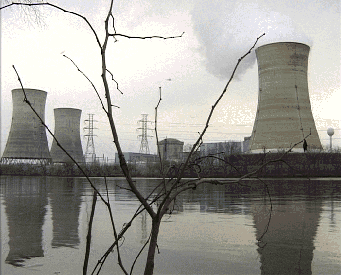
The
nuclear power station Three Mile Island, Harrisburg, Pennsylvania
|
|
MH:
But remember: there are other dangers like f.e. aging,
sloppery, corrosion ...
TPH:
Yes we‘ve had some great failures. The atomic
failure in Russia being probably the most dramatic. Then there
were the black outs in New York when New York City lost electrical
power. And then there was the terrible failure of The Challenger
system, the NASA system where the people on board the space
craft died. So there has been failures. Well Harrisburg is
so near here and I live in Pensylvania it‘s hard to forget
that. Yes there have been system failures. As you say systems
get old and there are various weak points in the system.
|
|
MH:
Do you see a way out of this dangerous path,f.e.
by recurring to Lewis Mumfords motto Small is beautiful?
TPH:
There has long been a debate between those who
say" small is beautiful" in technology and those
who want to centralize technology. It‘s a very complex
issue where there are no easy answers. I used to think that
the way to go was small generating plants in the field of
electricity for example. But certain economies of scale come
with the creation of large systems. In theory at least and
probably in practice. Electricity can be generated less expensively
if the system is a large one. There are some complicated reasons
for this, the load factor for example can be raised if you
have a very large system. You raise the load factor, you lower
the cost of electricity. So the economic reasons for the large
scale system and also the problem of scale and expertise.
If you have a number of small systems you have to have expertise
and skill spread over a large area among many people. There‘s
also the problem of expertise in skill and if you have many
small plants one has to have skill operaters and expert operaters
for many many small plants. You may not have that many experts
and skilled people. So in the past by concentrating electrical
light and power you could have a few experts and skilled people
presiding over a very large system from a central point. And
it‘s been found that if you have a number of small generating
plants connected onto a large system, in other words: a distributed
system, that often those plants are not well run. And if a
small plant fails it can upset the whole system. And so engineers
are very reluctant to have control of the system distributed
over a large area, electrical engineers, they‘d rather
have it concentrated where the experts and specialists are.
So I think if we really wanted to go in the direction of small
generating plants spread over an extensive area instead of
a concentrated power system there‘d have to be a lot
of new technology that would have to be developed in order
to control that new form of electrical generation. So it wouldn‘t
be simple, it wouldn‘t be easy to do it. If we invested
a great deal of money into it, we might be able to distribute
the electrical light and power sysem into smaller units. Yes
it‘s possible. I think it would be very expensive and
take a lot of time, but maybe we should do it.
|
|
|
|
MH:
I see few people who take the challenge seriously that maybe
we will not survive into the next century if we carry on as
we are.
TPH:
I think that usually in history when problems become
serious enough, when the pressure upon us is great enough
we will respond but we wait until that pressure is great and
the problem is quite serious. But I think we will. We know
that oil is becoming short, probably then we will begin to
devote our energies to other forms of energy. But you see
there‘s a heavy momentum, I use the term momentum, we‘ve
invested so much in oil. I mean look at all the what we call
service stations, look at all the big companies that are in
oil. Think of the enormous resources and number of the people
who live off of oil. You‘re not going to change that
over night, because the momentum is too great. It will only
be some relatively catastrophic event or some catastrophic
problem rising before us, that will lead us to break the momentum
of the way things are being done now. But it will probably
happen. It may come a little late but the momentum is usually
broken. I‘m trying to think of a good example for you.
Well yes, after WW II most of the air force generals were
commited to airplanes with pilots and they resisted the development
of unmanned missiles. But that momentum, the momentum of the
commitment to airplanes with pilots was finally broken for
some complex reasons. But you see the generals who came out
of WW II they were mostly pilots, they liked the airplanes,
they liked the sitting up in the pilot seat and they didn‘t
want these missiles without any pilots. But the momentum was
broken and the missiles were developped. And also the movement
towards automobiles that are run on alternative fuels is moving
ahead slowly. But something as massive as Detroit or something
as massive as Daimler Benz or VW is you can‘t change
it over night. But it will change if the pressures that are
brought to bear are great enough.
|
|
MH:
Can one say that the momentum of the system builder is
over?
Thomas
P. Hughes: Yes, the large corporations do not nourish
independant inventors because independant inventors often
bring what we call now a disruptive technology. A disruptive
technology is one that will destroy the status quo. For example
General Motors that makes automobiles with internal combustion
engines doesn‘t want an inventor to come with a disruptive
technology that will destroy the internal combustion engine
industry. So large corporations generally are not supporters
of independant inventors and radical invention. Remember,
Edison was not employed by a large corporation. Alexander
Graham Bell was not employed by a large corporation Elmer
Sperry was not employed...and now with large corporations
generally shaping technology in most fields except the computer
field, now remember where many of the major inventions came
out of garages and came out of universities not from large
corporations that‘s where the independent inventors flourished
for about 20 or 30 years in Paolo Alto in Silicon Valley to
be more precise or to be more descriptive. So there you have
a good example of change. Computers had radical changes. I
know it took some time to bring the desk top and the lap top
to us but on the general historical perspective changes in
Silicon Valley have been very rapid and very impressive. But
again small start ups have been the innovative places not
large corporations, generally speaking.
Manfred
Hulverscheidt: Thank you very much for this interview.
|
|
Copyright
©
2001-2002, HDTVideo, a Manfred Hulverscheidt site. All rights reserved.
Design By:
seamean@yahoo.com
|